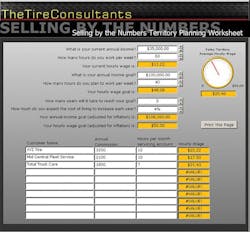This article by commercial tire sales expert Jason Miller is the latest installment in a multi-part series about how to land and keep commercial truck tire accounts. In the October edition of CTD, Miller discussed the fundamentals of customer retention. In this installment, he discusses time management. Miller’s book, “Selling by the Numbers,” is available from Amazon.com and other on-line booksellers. For more information about Miller and his company, TheTireConsultants, visit www.thetireconsultants.com.
No series on selling would be complete without discussing time management. In fact, it’s my most requested seminar topic. Can you actually manage time? You can manage people — adding some, subtracting some and telling them what to do. You can manage money — saving it or spending it. But time is not easily managed. You can’t get more, you can’t save it for later and you can’t tell it what to do. Each day, each person has 24 hours and must decide what to do with them. Your competitors have the same amount of time.
Modern time management
Modern time management methods can be compared to the popular computer game, Tetris. If you’ve never played Tetris, here’s a brief overview. You start with a blank screen while blocks of various sizes and colors descend from the top. You move these blocks as they drop, trying to leave no open slots. Once you fill an entire row, the row disappears. It’s an easy game in the beginning because the blocks are falling slowly. As the game progresses, the blocks fall faster. Eventually they drop so quickly that you don’t have enough time to position them without leaving open slots. At that point, the row does not go away, the screen fills and it’s game over.
Does that sound familiar? On your first day as a commercial tire salesperson, you had plenty of open slots; you made sales calls, hoping to make something happen. Customers began calling to ask questions, check prices and order tires. At first, the calls came in slowly; it was easy to fit them in your available time slots. As you signed more customers, calls started coming in faster. Eventually some assignments did not get done and were carried over to the next day. You started the next day with a list that was too big to handle. Meanwhile, the calls kept coming in faster and faster. Before you knew it, you were out of time.
Effective time management is not about staying busy; it’s about your goals. You must spend your time working on those things that are important to you. When you over-schedule, you miss important opportunities.
[PAGEBREAK]
Most of today’s time management courses were created during the Industrial Age. Assembly line activities were consistent from one day to the next and each assignment was to be completed in a fixed block of time. Managers examined each task to determine what needed to be done and fit those tasks together within the confines of a shift, leaving no open time slots.
If you’ve ever tried to use these methods to manage your time as a commercial tire salesperson, you know that they don’t work very well. Rarely are tasks consistent from one day to the next, plus a commercial tire salesperson’s tasks are not concrete.
You’ll waste time calling on people who, for whatever reason, may never buy from you. Some buyers will say “yes” on the first call. (If this happens, check their credit very closely.) Others may take months, even years, before they switch suppliers. Some sales calls will take much longer than expected; others will be quick. Each day you can expect some issue, question, crisis or concern. It’s the nature of the business. Because of this uncertainty, it’s critical that your schedule has some wiggle room.
Opportunities tend to present themselves unexpectedly and you must be available to seize them.
What’s it worth?
“Time is money.” We’ve all heard it and said it. But is it true? Picture me handing you a $20 bill. As I turn to walk away, I stop, whirl around and take it back. Can you do that with time?
et’s look at it from another angle. You may have competitors in your market who have more money, service trucks, inventory and locations. But do any of them have more than 24 hours a day? Clearly time is not money, but there is a connection: you trade one for the other. Make sure when you trade your time for money, it’s a great trade.
What’s your time really worth? The concept of hourly wages was much clearer for previous generations who came of age during or after the Industrial Revolution.
Many of our parents and grandparents had jobs where they punched in at the beginning of a shift and punched out at the end. They knew what their labor was worth since they worked for a specific number of hours and earned an hourly wage. There was a clear distinction between work time and home time. They did not bring work home with them and they rarely brought their personal problems to work.
If they started early or worked late, they were paid more for their time. To those generations, a fair day’s work yielded a fair day’s pay. If they did what they were told for 30 years, they could look forward to a secure retirement, when their time would be their own. They did not have to manage their time; it was managed for them.
Those days are long gone. There is no longer a clear distinction between work time and home time, especially for commercial tire salespeople. Most of us don’t punch a clock. We have some kind of home office, a cell phone, a home computer and we are constantly thinking about work, even when we’re home or on vacation.
[PAGEBREAK]
Of the hundreds of commercial tire salespeople I’ve worked with over the years, I’ve only met one who knew his hourly rate. The rest wake up every day, work hard, sell as much as they can and hope for the best.
The successful ones know that if you don’t manage your time, it will manage you. And I promise you will not like it.
Take a commercial tire salesman I recently consulted. He was at the end of his rope. Several years ago, he had signed a very demanding fleet customer. To service this large account, he worked from 5 a.m. until 8 p.m. each day. He worked a few hours on Saturday and even spent time on Sunday getting caught up on paperwork.
Not only was this customer taking his time away from other customers, it was cutting deeply into the time he spent with his family. At the same time, profit margins began to shrink because of fierce competition. His commission was based on gross profit, so this had a devastating effect on his income. He was trading more of his time for less money. Something had to give.
We sat down and analyzed his situation. His annual commission had dropped to under $40,000 per year while he worked an average of 75 hours a week. That’s an hourly wage of just over $10 per hour! It was not worth the time spent away from his family.
Does that situation sound familiar? Do you find yourself spending more time for fewer rewards? Here are some tips that will help you improve your “hourly wage”:
1. Quantify what your time is worth. Start by determining how much income you need. Then determine how much time you’re willing to spend to earn that money and still leave time for family, friends and hobbies. Divide your annual income requirement by the total time you plan to work each year; that’s your hourly wage goal.
2. Examine your customers. Then take the commission earned and divide it by the time they require. Be sure to include travel time, administrative time and problem solving. That’s the hourly wage they’re paying you. If that’s above your goal, your customers are part of the solution. If that’s below your goal, they’re part of the problem. To help you in this exercise, I have created what I call the “Selling by the Numbers Worksheet,” which is available for free at www.thetireconsultants.com.
3. Look closely at each customer who falls short of your hourly wage goal and brainstorm ways to boost the income or decrease time spent. Either approach will yield an improvement in your hourly wage. Sometimes it’s as simple as asking for a larger percentage of your customer’s business. You might ask if they really need to see you face-to-face each time or if they can live with a phone call every third or fourth visit.
You may find that your customers are wrestling with similar time constraints.
4. If you have accounts that will not yield a decent hourly wage either because they’re too demanding or don’t generate enough income, find replacements for them. Most commercial tire salespeople drive past dozens of fleet prospects on their way to their current customers.
5. Cluster your accounts together and set up a plan to see them on specific days. Excessive travel time destroys your hourly wage.
6. Don’t waste time on customers who don’t pay their bills. Slow paying accounts present a double threat to your time management. You waste time trying to collect payment and if they do go on credit hold you can’t sell them anything.
7. Think like a lawyer; the hourly wage you charge should be in direct proportion to what you can do for your client. Improve your skills and knowledge so that you can provide added value to your fleet customers.
As a commissioned salesperson, it’s up to you to manage your time. Nobody is going to do it for you. If you’re making your numbers, nobody really cares how hard you’re working. And if you’re not making your numbers, nobody really cares how hard you’re working! Selling is not about activity; it’s about productivity. Your job is to make every second count. ■
About the Author

Bob Ulrich
Bob Ulrich was named Modern Tire Dealer editor in August 2000 and retired in January 2020. He joined the magazine in 1985 as assistant editor, and had been responsible for gathering statistical information for MTD's "Facts Issue" since 1993. He won numerous awards for editorial and feature writing, including five gold medals from the International Automotive Media Association. Bob earned a B.A. in English literature from Ohio Northern University and has a law degree from the University of Akron.
